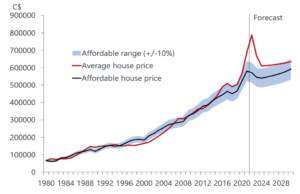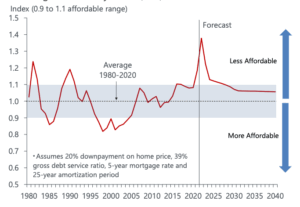Canadian Real Estate Prices Expected To Drop 24%, Can Crash 40%: Oxford Economics

Stephen Punwasi
Canadian real estate prices might be in for a bit of a dip if one of the world’s leading forecasters is right. Oxford Economics’ latest forecast shows home prices falling 24% by mid-2024. Higher interest rates and anti-speculation policies are forecast to begin the price declines this fall. If these measures fail to correct prices and they rise further, a crash of 40% and a financial crisis is expected.
Canadian Real Estate Prices Are Expected To Fall 24%
The firm sees a substantial decline in home prices, but not enough to roll back to pre-2020. Beginning this fall, they’re forecasting a 24% decline that will bottom by mid-2024. Home prices have increased 50% since the Bank of Canada (BoC) began cutting interest rates. Even with this correction, the firm expects prices to still be 15% higher than pre-2020.
Canadian Home Prices Expected To Fall 24% By 2024
The average price of a home in Canada, the household affordability range, and Oxford Economics’ forecast for future price gains.

Source: Oxford Economics.
Don’t expect home prices to bounce back quickly afterward. From 2025 to 2030, they see supply outpacing demand and keeping annual growth under 1% for five years. This will allow incomes to catch up and affordability to return by mid-2028. The forecast is an ideal combination of price declines and stagnations minimizing fallout. If this were to happen, they don’t see a recession or significant economic drag. Most of the price declines would be unrealized by owners.
Lower Home Prices Are Expected To Restore Housing Affordability
The Oxford Economics Housing Affordability Index (HAI) for Canada.

Source: Oxford Economics; Haver Analytics.
If Canadian Home Prices Keep Rising, They Expect A 40% Crash and A Financial Crisis
Just two years ago, the firm didn’t consider such a significant decline in prices possible. Then the boom in 2020 began, pushing home prices to an extreme. If prices continue the “unsustainable” climb, the correction turns into a crash. In this scenario, a 40% price drop would happen, as well as the potential for a financial crisis. They also stress it’s unlikely, but the 24% drop in their base case scenario can result in further fallout. Further research is needed in this area, which they plan to update us with.
Inflation Is Expected To Push Negative Returns Until 2030
The firm uses nominal price data, and sees inflation playing a big role in affordability. Investors may want to take note of this, since CREA’s benchmark is inflation-adjusted. Let’s assume the BoC manages a 2-point inflation target from 2024 to 2030. By 2030, the price of a home will be 5% higher than the inflation adjusted value in 2020. The base case shows 5% growth over a whole decade, which is a big change from the past decade.
The firm argues a home price correction “may cause some near-term pain,” but it’s needed for a healthy economy. As mentioned, those primarily impacted would be recent home buyers and investors. The former is unlikely to realize any losses, since they would be living in the home for a while.
The alternative, if the disconnect is preserved, results in long-term economic damage. Both the leverage required and perpetually diverting cashflow are big risks. Every dollar spent on housing is one not put into more productive parts of the economy. If cities prioritize home price growth ahead of local economic growth, future economic growth is stifled. When that happens, cities and countries providing a better value proposition become more attractive. Even New York, with an economy the size of Canada, struggles to keep its population growing at these prices.




